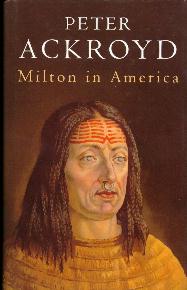

MILTON IN AMERICAby Peter AckroydSinclair-Stevenson1-85619-696-8277pp/£16.99/1996 |
 |
Reviewed by Steven H Silver
In 1660, with the restoration of Charles Stuart to the English throne, the poet John Milton, who was a staunch supporter of Cromwell's was gaoled and pardoned by the king at the request of Milton's former secretary. In Milton in America, that same secretary has helped arrange passage for Milton out of England to avoid the royal wrath. As he makes his way to his ship, Milton makes the acquaintance of a young boy, Goosequill, who becomes his new secretary and the chronicler of his advantures in the New World.
Told from both Milton and Goosequill's points of view, alternating between flashbacks and contemporary views of their voyage, Goosequill tells how Milton, known in our world for the poem Paradise Lost, is shipwrecked in America and must make his way through savage lands as he attempts to build a country which will reflect his image of God's plan.
Ackroyd does a good job in recreating the language used in the seventeenth century at the expense of readability to the modern reader. Many of his conceits make it difficult to determine who is speaking and when the action is taking place. His characters, however, are very realistically drawn and Milton comes across as pompous and arrogant, yet a true believer in the faith he professes. On the other hand, Goosequill serves as Milton's guide and foil. While Milton is dour, Goosequill delights in life. Milton has an educated sense of humor, Goosequill laughs at pratfalls. Seeing Goosequill through Puritanical eyes, Milton remonstrates him for his joyous behavior, thereby accentuating the differences between the two men. Although Ackroyd protrays Milton as something of an hypocrite, his hypocrisy does not extend to his religion. He expects everyone else to live up to the same standards he sets for himself, believing that only he knows by what standards a person should live.
Once in the New World, Milton and his companions attempt to create a Puritanical Eden at New Milton (humility not being one of Milton's virtues, he readily acquiesces to the name change). In fact, the first half of the novel, in which Milton arrives in America and plots his course in creating a utopia (although he would not use the name created by a Papist), is entitled "Eden". That section ends with the discovery of murder and sin in New Milton. The second section, "Fall" begins shortly after justice has been done with the arrival of Papists in the area who have begun the settlement of Mary Mount across the river.
Mary Mount gives Goosequill what he yearns for. Unlike most of the characters in the novel, Milton's scribe does not much care about religion. Instead, he is simply looking to enjoy life as much as he can. Although this attitude is evident from a early part of the novel, it is only when he begins to describe the pomp of Roman Catholicism that Goosequill really demonstrates that portion of his character. Naturally, his ties to John Milton and his own new wife, Kate Jervis, do not allow him to fully indulge in life at Mary Mount.
Mary Mount allows Ackroyd to demonstrate exactly how closed minded and strict the Puritans, and particularly John Milton, really are. Up to this point in the novel, there is nothing to contrast Milton's character to. Mary Mount provides that contrast. Of course, when Milton's letters are decribing Mary Mount, the novel's view is that this new city is a serpent in the garden. Goosequill's observations are the ones which truly permit comparison. Of course, Milton's blindness and obstinencey forces him to send someone to Mary Mount. His selection to send Goosequill is curious since, although he is Milton's scribe and confidant, he is also the one person in New Milton who is most likely to succumb to the vanities of the Catholic settlement.
Ackroyd's portrayal of the Catholics, led by Ralph Kempis, is also interesting. While Milton and his Puritans are close-minded, the Catholic community acts very much like people in the modern day. Although they aren't politically correct by a long shot, the Catholics are more than happy to view the natives as human and accord them equal opportunities once they have adopted Catholicism.

| Return to |